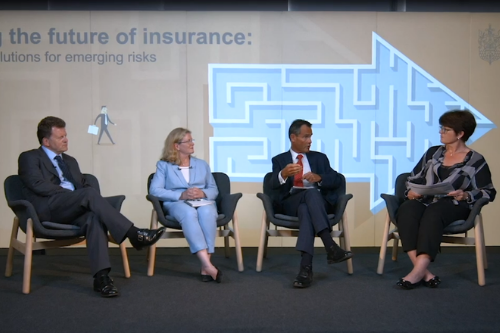

Innovation was the word of the day at the Chartered Insurance Institute (CII)’s half-day digital conference on “Shaping the Future of Insurance”. The event sequestered the insights of senior leaders across the insurance profession to explore how well prepared the modern insurance sector is to meet the demand for innovation.
Lending his thoughts on the topic, Anthony Baldwin, CEO of AIG UK, highlighted five key challenges – firstly the increased pace of digitalisation, which is changing working trends and consumer expectations. Secondly, large scale automation is on the industry’s doorstep, he said, which is prompting a rethink regarding the future of work.
Thirdly, Baldwin said, innovation has gained momentum and continues to transform the financial services sector. Fourth, a strong public focus on sustainability is forcing a rethink of corporate priorities, and finally, intangibles such as intellectual property and brand recognition are increasingly important drivers of value creation.
“All these changes point to a shifting paradigm in the global modern economy,” he noted. “Insurance touches every sector of the real economy and, as such, it must evolve with it. Already several insurance products explore new types of cover, for example, on-demand insurance has been built to cater for the needs of the sharing economy [while] parametrics has enabled the automatic processing of small claims - and that same technology is helping insurers to tailor premiums for the needs of individual customers.”
Success will be determined by access to capital, data and skills, he said, and the 2020s will be a decade of rapid change for the global economy, and of disruption for the industry. Baldwin believes that the London market is well placed to take advantage of this but that the sector must continue to work together to attract and retain the agile workforce of the future. Only with this fresh talent, can the London market develop the skills it requires to solve these unmet needs.
Examining where the insurance industry has the potential to go, with regards to innovation, Artur Niemczewski, partner at Arthur Fleming & Co. Ltd (pictured, second from right), highlighted that insurance tends to be quite strong when it comes to being innovative, and understanding and managing risks. This is not only the domain of start-ups and insurtechs, he said, but is also done very well by some of the more established and traditional companies.
Niemczewski highlighted how, in 2017, Swiss Re placed a bond to cover a pandemic for emerging markets on the back of Ebola for half a billion dollars. While it wasn’t enough, it was a brilliant idea that showed clear foresight. And if pandemics are the first horseman of the apocalypse, he said, then cyber insurance is the second.
“Again, as an industry, we’re very good at understanding what the cyber risks are, how they evolve, and [given] the brazenness of the latest attacks on the Colonial pipeline and the JBS meat processing plant, we do understand what’s going on,” he said. “There’s a lot of technology, lots of innovation, and lots of players, both old and new.
“But, actually, because we understand how bad is bad, [insurers are] reducing the limits of aggregate cover because we see the massive scale [of] those attacks. We understand how to manage risk, we understand how risks are evolving but the financial resources are there, and are the policyholders willing to pay for the level of risk?”
This is a similar dilemma to the one revolving around earthquake cover, he said, citing research from Swiss Re that revealed that only 13% of California residents buy earthquake coverage. This is because they either can’t afford it or they think the government will be there to bail them out.
As a profession, Niemczewski is confident that the widely available expertise, combined with the sector’s ability to innovate, understand risk, and mitigate those risks, are trump cards for addressing these concerns. The question, however, comes down to a matter of financial priorities, the willingness to pay and whether the balance sheet of the industry is large enough.
“So, I think what we bring to the table is the know-how,” he said, “the ability to understand how risks are evolving, and also our ability to address the bad events when they happen - be it either through financial resources, repairs, putting things back right, rebuilding or addressing people’s health. [The question] is, how do we create a win-win partnership where we can tap into our financial resources to make the wrongs right?”
